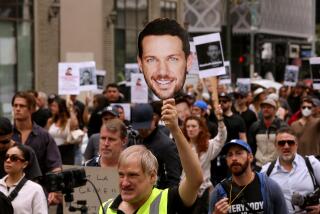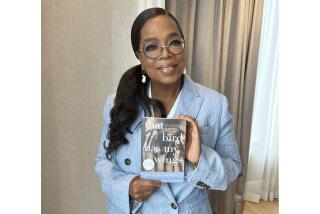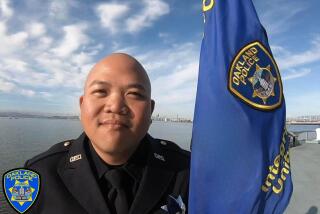Trial of ex-Raider may hinge on phone records and taped interview
The trial of a former Oakland Raiders defensive end accused of participating in the “execution” of an acquaintance in a desolate corner of Lancaster may hinge on cellphone records and a taped interview with the weeping defendant.
Before jurors began deliberating in earnest Friday, prosecutors argued that Anthony Wayne Smith was crying “crocodile tears” when he told investigators he wasn’t involved in the death of 31-year-old mechanic Maurilio Ponce on Oct. 7, 2008. Cellphone tracking technology placed Smith and two accomplices near the death scene, the prosecutor said, and Smith was found with the victim’s cellphone, car and keys.
“Friendship, betrayal and lies — that’s what this case is all about,” Deputy Dist. Atty. Taly Peretz told jurors at the Antelope Valley courthouse in closing arguments Thursday. “There is no doubt that the person who committed this crime committed murder in the first degree.”
Smith, 44, played professional football with the Los Angeles and Oakland Raiders between 1991 and 1998.
Prosecutors said Smith told investigators that he and Ponce were involved in smuggling stolen cargo, and on the night of his death Ponce promised to give Smith $10,000 to move some stolen car tires.
Though prosecutors did not describe a motive in the case, court testimony revealed that Ponce and his wife were struggling financially and had fallen behind on payments on their leased SUV. They allegedly enlisted Smith to do away with the car, according to defense attorneys.
Peretz told jurors that Smith got the inspiration to kill Ponce from a book called “Professional Killers: An Inside Look.” The book outlines key strategies for committing murder such as choosing a remote location, incapacitating the victim and using a firearm.
But defense attorney Michael S. Evans insisted that Smith was innocent and had no reason to kill Ponce.
“There is not one tiny bit of evidence that shows Mr. Smith’s DNA … his hands ever touching Ponce … him firing a gun, or with a gun that day,” Evans said.
Ponce’s body was found with six gunshot wounds, including two to the head.
Two other men, Charles Eric Honest, 42, of Los Angeles, and Dewann Wesley White, 33, of Bloomington, have also been charged in connection with Ponce’s death.
Smith and Honest were tried simultaneously by separate juries. The panel in Smith’s trial started deliberating Thursday. Honest’s jury was expected to begin deliberations Monday. White’s trial is expected to begin April 16, according to the L.A. County district attorney’s office.
Some jurors appeared fatigued as Peretz meticulously presented a timeline of phone calls she said established the “pattern of travel” of Smith, Honest and White on Oct. 6 as they coordinated, eventually hooked up, headed to Lancaster to kill Ponce and then returned to Los Angeles. A phone call Smith made to Ponce at 11:07 p.m. finally “lured” the victim from his house and to his death, Peretz said.
“Is it just a big coincidence that the same night that Smith brings his friend Charles Honest to Santa Clarita … the same night he plans to meet with Maurilio … that Maurilio ends up dead?” the prosector asked.
After Ponce was already known to be dead, the victim’s cellphone — later found with Smith — was “pinging off” towers in the area where the cellphones of Honest and White were also registering, Peretz pointed out.
But Evans, who transfixed some jurors with his delivery, which alternated between booms and near-whispers, said there was no proof Smith ever left the Santa Clarita Valley and went to Lancaster. There was also a 12-hour period during which Smith and Honest never communicated by phone — odd if Smith was directing and planning a murder, Evans said. And phone records showed that Ponce was the “initiator” that fateful day, the defense attorney said, noting that he called Smith at least six times.
“There’s no luring going on here by Mr. Smith,” Evans said.
Ponce never showed up for his planned meeting with Smith in Santa Clarita. When Smith picked up Ponce’s car at a tire shop the day after the slaying, the victim’s cellphone was inside, Evans said.
The defense also told jurors that Ponce’s killing was possibly linked to three men a witness saw speeding from the site of the slaying on the night of the crime, and to a stolen pickup truck that was found burned with a bullet hole in its side several miles from the spot where Ponce died.
Peretz called that theory a distraction and accused Evans of attempting to fool the jury by distorting the evidence. She urged jurors to listen again to the words, manner and tone of voice in Smith’s interviews with investigators after the crime in order “to find the ultimate truth of Smith’s guilt.”
“His statements are full of lies, inconsistencies and inexplicable stories that don’t add up,” Peretz said. She accused Smith of crying “crocodile tears” and underscored his silence upon learning that Ponce was dead.
But Evans countered that Smith wept at least six times throughout the interview, and detectives even commented that he was shaking. His lack of immediate comment upon learning of Ponce’s death simply indicated that he was shocked, Evans said.
More to Read
Sign up for Essential California
The most important California stories and recommendations in your inbox every morning.
You may occasionally receive promotional content from the Los Angeles Times.











